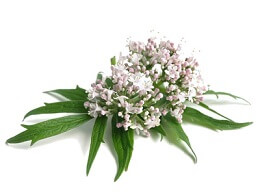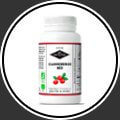Main properties and uses of valerian
Valerian is a medicinal plant mainly recognized for its sedative and relaxing effects to treat sleep disorders such as insomnia and difficulty falling asleep. It would have a positive effect on the quality and duration of sleep. It is also attributed an effective and beneficial role in dealing with problems of stress, anxiety and anxiety as well as antispasmodic properties. Finally, it would have an anti-neuralgic and anti-rheumatic effect, relieving nerve pain and rheumatism.
Main Uses of Valerian:
- Sleeping troubles :

- Anxiety, stress:

- Nervous agitation:

Secondary Uses of Valerian:
- Rheumatism:

- Névralgies :

- Digestive spasms:

- Palpitations :

- Premenstrual disorders:

Different forms of use of valerian:
Valerian can be consumed in different forms:
- Although the capsule remains the most convenient form, valerian is available in other forms.
- Powder: use mixed with water at bedtime.
- Herbal tea and decoction: boil water and let the valerian infuse for a few minutes. To be taken preferably in the evening.
- Tincture: dilute in a glass of water
- Poultices: obsolete these days

Valerian ID Card
- Botanical name:
Valeriana officinalis - Synonyms:
catnip, Notre-Dame grass
- Family :
valerianaceae - Part used:
root
- Harvest time:
autumn - Geographic origin :
France, Germany, Croatia, Poland
-
Valerian as a sedative (sleep disorders):
A sedative is a substance that has a calming action on the central nervous system, causing relaxation and calming, reducing anxiety, agitation and stress. It causes some drowsiness and slows breathing. Traditional (or allopathic) sedative medications can be addictive, and suddenly stopping their use can cause withdrawal symptoms such as insomnia, agitation, and anxiety. In France, a medicine containing valerian is “traditionally indicated in the symptomatic treatment of neurotonic conditions in adults and children, particularly in cases of minor sleep disorders”. ESCOP (European Scientific Cooperative on Phytotherapy), the World Health Organization and Commission E have also recognized valerian as a plant treating anxiety, nervous agitation but also sleep disorders caused by an anxious state. . Anxiety and sleep disorders often go hand in hand, by regulating sleep, valerian can also help in the fight against stress. It is for its numerous properties that valerian has been used since ancient times. -
Valerian as an antispasmodic:
An antispasmodic is a substance intended to treat spasms. These are generally digestive or genitourinary and correspond to intense contractions of involuntary muscles (those that we cannot control by will) which occur suddenly. Valerian is often used as an antispasmodic, especially for abdominal cramps and uterine cramps. It would be effective against dysmenorrhea (pain which precedes, accompanies or follows menstruation). All this encourages us to think that this medicinal plant could have a beneficial effect in the face of pathologies that affect the digestive muscles.
-
Valerian as an anti-neuralgic:
Neuralgia is pain of neurological origin, which can resemble a burn, cut or electric shock due to its type and intensity. It follows inflammation or damage to a nerve and can continue once the lesion or inflammation has resolved. It can be permanent or occur suddenly, either following a movement or pressure on the area in question, or spontaneously. It is a nervous pathology which can become very disabling for individuals who suffer from it. Valerian root could have a beneficial effect against trigeminal neuralgia (facial neuralgia), which is very painful. Sometimes referred to as a painful tic, this manifests itself as sharp pain affecting one side of the face. Valerian, through its soothing effect, would reduce pressure on the nerves, thus remedying the fundamental cause of facial neuralgia. It would also be effective against associated spasmodic pain.

The most interesting synergies based on valerian
In order to optimize the effects of valerian, it is possible, or even recommended, to combine it with other plants, essential oils or natural active ingredients. Here you will find some advice depending on the problem concerned:-
Sleep problems, anxiety, stress:

Plants: lemon balm (relieves nervousness, sleep disorders and helps with digestion), passionflower (helps with anxiety and nervousness) and chamomile (against nervous agitation and insomnia)
Essential oils: ylang-ylang (against insomnia and nervousness), fine lavender and lavandin (sleep disorders, nervousness), neroli (nervousness, difficulty falling asleep)
Other active ingredients: magnesium (helps reduce anxiety), melatonin (makes it easier to fall asleep, improves sleep quality) -
Mood disorders, depression:

Herbs: St. John's wort (treats mild to moderate depression), saffron (positive effect on symptoms of depression), rhodiola (relieves anxiety and depression)
Essential oils: grapefruit (soothes emotional shock and depression), frankincense (helps with meditation and calms the mind), yarrow (against latent depression and vacillating mood)
Other active ingredients: tryptophan (precursor of serotonin: treatment of depression), L-tyrosine (presumed antidepressant effect) -
Spasmodic pain:

Plants: lemon balm (relieves minor gastrointestinal spasms) ginger (against digestive disorders), fennel (against digestive disorders)
Essential oils: tarragon (powerful antispasmodic), peppermint (digestive tonic), clary sage (reduces menstrual pain)
Other active ingredients: arginine (against difficult digestion), evening primrose oil (relieves premenstrual disorders)
Precautions for use and contraindications of valerian:
This information is not exhaustive!! Always also consult the instructions on the product packaging as well as the manufacturer's recommendations. If in doubt, consult a health professional.
Valerian can create a state of drowsiness, which is why it is important to respect therapeutic doses, particularly during the day.
When consumed over the long term, valerian can be toxic to the liver. This is why it is not recommended to follow a treatment based on valerian root extract for more than 6 weeks. Having been associated with cases of liver damage and pancreatic infections, it is important to consult your doctor if you ever have a condition affecting the pancreas, liver or gallbladder.
- Keep out of reach of young children, Use reserved for adults.
- Not recommended for children under 12 years old, pregnant or breastfeeding women.
- This product cannot replace a varied diet and a healthy lifestyle.
- Do not exceed the recommended daily dose.
Interactions to consider with valerian:
Attention ! Valerian may increase the duration of the sedative effect of central nervous system medications used to treat problems such as anxiety, insomnia, psychiatric disorders, or seizures. Due to its sedative properties, valerian can also increase the risk of drowsiness from these medications. It is also advisable to avoid consuming alcohol, for the same reasons.
Valerian can amplify the effects of haloperidol (a typical first-generation neuroleptic) and cause liver damage. Likewise, it can increase the risk of adverse effects of drugs metabolized by cytochromes P450.
Valerian may also increase the sedative effects of other plants or the liver toxicity of certain plants.
If in doubt, consult your doctor or pharmacist.

Valerian and sleep: an update on the issue
Sleep disorders affect a large number of people around the world. Insomnia in particular can become very disabling in everyday life and prevent individuals who suffer from it from carrying out their daily activities correctly. This is why we decided to look into the effects that valerian would have on sleep.
WARNING: Valerian cannot in any way replace the advice of a general practitioner.
The effects of valerian have been talked about since ancient times and nowadays it is frequently used to treat sleep disorders, especially in Europe. Research on valerian has progressed greatly since the last century, particularly in terms of its effect on sleep.
A systemic review identified and evaluated nine randomized (= people receiving placebo and those receiving valerian were randomly selected) double-blind clinical trials (= neither the doctor nor the patient knows whether the patient is being treated with a placebo or valerian) studying the effects of valerian compared to those of a placebo in individuals suffering from sleep disorders. Although each of these studies had biases, three stood out.
In the first study, researchers administered three preparations to 128 volunteers. 400 mg of valerian fluid extract, a product containing 60 mg of valerian and 30 mg of hops as well as a placebo. Participants took each of these preparations three times in random order over nine non-consecutive nights and then completed a questionnaire each following morning. The fluid extract of valerian showed better effects than the placebo in terms of time to fall asleep, quality of sleep and number of nighttime awakenings. Although this result does not confirm that valerian is effective against insomnia, these results remain encouraging.
The second study evaluated the effects of a fluid extract of valerian (450 mg or 900 mg) versus those of a placebo on sleep latency in eight volunteers suffering from mild insomnia. The preparation containing 450 mg of fluid extract of valerian reduced the latency to fall asleep from 16 to 9 minutes (which is similar to the effect of benzodiazepines, a group of allopathic sedative molecules par excellence). In questionnaires completed by participants, it was noted that the 900 mg preparation improved sleep quality but also led to more sleepiness the next day. However, these results are not really clinically significant given the small number of participants which makes generalization to a larger population difficult.
The third study evaluated the effects of valerian (600 mg of a preparation of dried valerian root) versus placebo in 121 participants suffering from insomnia for 28 days. At the end of the trial, the group having received the root extract ofValerian has been shown to reduce symptoms related to insomnia. The difference in improvement between placebo and valerian increased from the 14th day.
However, clinical trials remain insufficient to confirm the effectiveness of valerian in the treatment of sleep disorders, but all these preliminary results remain promising.
On the other hand, a meta-analysis of sixteen different clinical studies on the effect of valerian root extract on sleep disorders compared to that of placebo, showed interesting results. The sixteen studies involved a total of 1093 individuals and were administered doses between 225 mg and 1215 mg of valerian root extract daily. Although the studies concerned presented some methodological problems, the conclusion of this systemic review remains encouraging and suggests that valerian can improve the quality of sleep by notably shortening the time it takes to fall asleep. What's more, its side effects are fewer compared to those of commonly prescribed sleeping pills. However, the authors of this meta-analysis believe that due to the limitations induced by these sixteen studies, larger randomized controlled trials, following established guidelines, should be conducted to obtain more conclusive results. It would be necessary to be able to determine the daily dose necessary for valerian root to be effective but also to evaluate the undesirable effects, taking into account the development of tolerance and withdrawal effects.
Bibliography of this study: Valerian for insomnia: a systematic review of randomized clinical trials. Stevinson C, Ernst E. Sleep Med. 2000.
Assessing the quality of randomized clinical trial reports: is blinding necessary? Jadad AR, Moore RA, Carroll D et al. Controlled clinical trials. 1996.
Aqueous extract of valerian root (Valeriana officinalis L.) improves sleep quality in humans. Leathwood PD, Chauffard F et al. Pharmacology, biochemistry and behavior. 1982.
Aqueous extract of valerian reduces sleep latency in humans. Leathwood PD, Chauffard F Planta Medica.1985.
Valerian for sleep: a systematic review and meta-analysis. Stephen Bent, Amy Padula, et al. Am J Med. 2006
Conclusion and professional opinion:
Valerian has been recognized for its sedative, stress-relieving and sleep-inducing properties for several centuries. It can have a beneficial effect in individuals suffering from mild sleep disorders but also be used as a complementary treatment for problems of anxiety and nervous agitation. . If there is no improvement after four weeks of treatment, a medical consultation is strongly recommended.
Although the results of certain studies are encouraging, further research is needed to better understand the effects of this medicinal plant on the human body, as well as the adverse effects that could be associated with it.
The data summarized here is given for information purposes and cannot engage our responsibility.
For further information on use, instructions for use, precautions to take and uses advised against, please refer to the commercial data sheet and label of your products. The food supplements described here are natural plant-based products. However, they are not without danger and without possible interactions with other medications or treatments. It is therefore very important to respect the recommended doses and to tell your doctor or pharmacist that you are taking these products: only he or she will be able to determine if any interactions exist between the food supplement and another treatment or medication that you may be taking.
The pathologies cited in this article are illnesses that can be serious or even life-threatening. A visit to a doctor remains essential. Only he will be able to make a precise diagnosis and, if necessary, provide you with the most appropriate treatment.
Bibliography
- The Retrospective of Practical Medicine and Surgery. William Braithwaite, James Braithwaite, Edmond F. Trevelyan. 1868
- Phytotherapy from the Heart of the Earth. Sharol M. Tilgner. 1999
- Valeriana Officinalis: Analytical, Quality Control and Therapeutic Monograph. Roy Upton. 1999
- Valerian. Or, the virtues of this root in nervous disorders; and the characteristics which distinguish the true from the false. John Hill. 1772
- https://ods.od.nih.gov/
- The effect of valerian root extract on the severity of premenstrual syndrome symptoms. Zahra Behboodi Moghadam, Elham Rezaei et al. J Tradit Complément Med. 2016
- Treating depression comorbid with anxiety - results of an open-label, practice-oriented study with St. John's wort WS 5572 and valerian extract at high doses. Müller D, Pfeil T. Phytomedicine. 2003
- The effects of hydroalcoholic extract of Valeriana officinalis L. on depression-like behaviors in rats sensitized to ovalbumin. Ali Neamati, Fariba Chaman et al. J Pharm Bioallied Sci. 2014
- Medicines Agency (1998). Plant-based medicines - Agency notebooks n°3, 81 p. St Denis
- Antispasmodic and hypotensive effects of Valeriana wallichii are mediated by activation of K+ channels. Gilani AH, Khan AU et al. J Ethnopharmacol. 2005
- https://www.vidal.fr/
- An alternative treatment for anxiety: a systematic review of human trial results reported for the Ayurvedic herb Ashwagandha (Withania somnifera). Morgan A. Pratte, Kaushal B. Nanavati et al. J Alterne Complément Med. 2014
- The effects of magnesium supplementation on subjective anxiety. Boyle NB, Lawton CL. Magnes Res. 2016
- Efficacy and safety of exogenous melatonin for secondary sleep disorders and sleep disturbances accompanying sleep restriction: a meta-analysis. Buscemi N1, Vandermeer B et al. BMJ. 2006
- Saffron (Crocus sativus L.) and major depressive disorder: a meta-analysis of randomized clinical trials. Hausenblas HA, Saha D et al. J Integr Med. 2013 Handbook of African Medicinal Plants. Maurice Iwu. 2014
- My herbal medicine bible: The reference guide to treating yourself with plants. S. Lacoste. 2014
- Second-tier natural antidepressants: a review and critique. Iovieno N, Dalton ED et al. J Affect Disorder. 2011
- Serotonin on demand: supplementation with the serotonin precursor, 5-hydroxytryptophan. Turner EH, Loftis JM et al. Pharmacol Ther. 2006
- The antidepressant effect of L-Tyrosine-loaded nanoparticles: behavioral aspects. Abdelrahman Alabsi, Adel C. Khoudary, et al. Ann Neurosci. 2016
- https://eurekasante.vidal.fr/medicaments
- Essential oils. Joëlle Le Guehennec. 2017
- https://www.mskcc.org
- Valerian for insomnia: a systematic review of randomized clinical trials. Stevinson C, Ernst E. Sleep Med. 2000.
- Assessing the quality of randomized clinical trial reports: is blinding necessary? Jadad AR, Moore RA, Carroll D et al. Controlled clinical trials. 1996.
- Aqueous extract of valerian root (Valeriana officinalis L.) improves sleep quality in humans. Leathwood PD, Chauffard F et al. Pharmacology, biochemistry and behavior. 1982.
- Aqueous extract of valerian reduces sleep latency in humans. Leathwood PD, Chauffard F Planta Medica.1985.
- Valerian for sleep: a systematic review and meta-analysis. Stephen Bent, Amy Padula, et al. Am J Med. 2006
NOTE: This article was written by a pharmacist. The data summarized there come from the scientific literature and the references cited above. For medical advice, in the event of specific or prolonged symptoms, please consult your doctor. Only he will be able to make a precise diagnosis and provide you, if necessary, with the most appropriate treatment.
 OUR
OUR